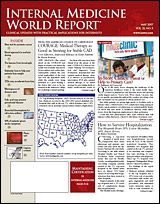End of an Era: Garlic Has No Effect on LDL Cholesterol
Decades of conflicting reports about garlic’s ability to improve heart health have now come to a conclusion after the first independent, long-term, head-to-head assessment of raw garlic and garlic supplements has demonstrated that daily consumption of garlic—either raw or in the form of 2 of the most popular garlic supplements—does not lower low-density lipoprotein (LDL) cholesterol levels (Arch Intern Med. 2007; 167:346-353).
“It just doesn’t work,” said lead author Christopher Gardner, PhD, of the Stanford Prevention Research Center, Stanford, Calif. “There’s no shortcut. You achieve health through eating healthy food. There isn’t a pill or an herb you can take to counteract an unhealthy diet.”
This study included 192 patients (aged 30-65 years) with moderately elevated LDL cholesterol levels of from 130 to 190 mg/dL. “These are the people who are the most likely to use supplements,” Dr Gardner said. “If their cholesterol is higher, then their doctors would be putting them on statins or some other prescription medication.”
Participants were randomly assigned to raw garlic, an aged garlic supplement (Kyolic-100; Wakunaga of America), a powdered garlic supplement (Garlicin; Nature’s Way), or placebo; these were taken 6 days weekly for 6 months.
All but those assigned to placebo consumed the equivalent of a 4-g clove of garlic every day; thus for those taking garlic supplements this meant taking slightly more than the dosage recommended on the package instructions for both supplements.
The participants were closely monitored throughout the study to make sure they did not gain or lose weight, which might have affected their cholesterol levels.
Analysis of monthly blood samples revealed that LDL cholesterol concentrations remained virtually unchanged from start to finish.
“Our study had the statistical power to see any small differences that would have shown up, and we had the duration to see whether it might take a while for the effect of the garlic to creep in. We even looked separately at the participants with the highest versus the lowest LDL cholesterol at the start of the study, and the results were identical,” Dr Gardner said.
“If garlic was going to work, in one form or another, then it would have worked in our study,” Dr Gardner added. “The lack of effect was compelling and clear. We took cholesterol measurements every month for 6 months, and the numbers just didn’t move. There was no effect with any of the 3 products, even though fairly high doses were used.”
